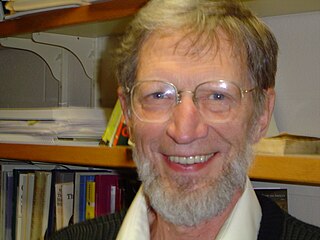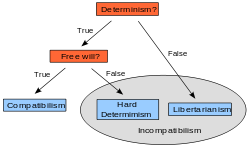
Omnipotence is the quality of having unlimited power. Monotheistic religions generally attribute omnipotence only to the deity of their faith. In the monotheistic religious philosophy of Abrahamic religions, omnipotence is often listed as one of God's characteristics, along with omniscience, omnipresence, and omnibenevolence. The presence of all these properties in a single entity has given rise to considerable theological debate, prominently including the problem of evil, the question of why such a deity would permit the existence of evil. It is accepted in philosophy and science that omnipotence can never be effectively understood.
The problem of evil is the question of how to reconcile the existence of evil and suffering with an omnipotent, omnibenevolent, and omniscient God. There are currently differing definitions of these concepts. The best known presentation of the problem is attributed to the Greek philosopher Epicurus. It was popularized by David Hume.

In the philosophy of religion, a theodicy is an argument that attempts to resolve the problem of evil that arises when omnipotence, omnibenevolence, and omniscience are all simultaneously ascribed to God. Unlike a defence, which merely tries to demonstrate that the coexistence of God and evil is logically possible, a theodicy additionally provides a framework wherein God's existence is considered plausible. The German philosopher and mathematician Gottfried Leibniz coined the term "theodicy" in 1710 in his work Théodicée, though numerous attempts to resolve the problem of evil had previously been proposed. The British philosopher John Hick traced the history of moral theodicy in his 1966 work Evil and the God of Love, identifying three major traditions:
- the Plotinian theodicy, named after Plotinus
- the Augustinian theodicy, which Hick based on the writings of Augustine of Hippo
- the Irenaean theodicy, which Hick developed, based on the thinking of St. Irenaeus

The omnipotence paradox is a family of paradoxes that arise with some understandings of the term omnipotent. The paradox arises, for example, if one assumes that an omnipotent being has no limits and is capable of realizing any outcome, even a logically contradictory one such as creating a square circle. Atheological arguments based on the omnipotence paradox are sometimes described as evidence for countering theism. Other possible resolutions to the paradox hinge on the definition of omnipotence applied and the nature of God regarding this application and whether omnipotence is directed toward God Himself or outward toward his external surroundings.

Alvin Carl Plantinga is an American analytic philosopher who works primarily in the fields of philosophy of religion, epistemology, and logic.

John Leslie Mackie was an Australian philosopher. He made significant contributions to ethics, the philosophy of religion, metaphysics, and the philosophy of language.
The existence of God is a subject of debate in theology and the philosophy of religion. A wide variety of arguments for and against the existence of God can be categorized as logical, empirical, metaphysical, subjective or scientific. In philosophical terms, the question of the existence of God involves the disciplines of epistemology and ontology and the theory of value.

Molinism, named after 16th-century Spanish Jesuit theologian Luis de Molina, is the thesis that God has middle knowledge : the knowledge of counterfactuals, particularly counterfactuals regarding human action. It seeks to reconcile the apparent tension of divine providence and human free will. Prominent contemporary Molinists include William Lane Craig, Alfred Freddoso, Alvin Plantinga, Thomas Flint, Kenneth Keathley, Dave Armstrong, John D. Laing, Kirk R. MacGregor, and J.P. Moreland.
In philosophy, metaphysical necessity, sometimes called broad logical necessity, is one of many different kinds of necessity, which sits between logical necessity and nomological necessity, in the sense that logical necessity entails metaphysical necessity, but not vice versa, and metaphysical necessity entails physical necessity, but not vice versa. A proposition is said to be necessary if it could not have failed to be the case. Nomological necessity is necessity according to the laws of physics and logical necessity is necessity according to the laws of logic, while metaphysical necessities are necessary in the sense that the world could not possibly have been otherwise. What facts are metaphysically necessary, and on what basis we might view certain facts as metaphysically but not logically necessary are subjects of substantial discussion in contemporary philosophy.

The phrase "the best of all possible worlds" was coined by the German polymath and Enlightenment philosopher Gottfried Leibniz in his 1710 work Essais de Théodicée sur la bonté de Dieu, la liberté de l'homme et l'origine du mal, more commonly known simply as the Theodicy. The claim that the actual world is the best of all possible worlds is the central argument in Leibniz's theodicy, or his attempt to solve the problem of evil.

The Irenaean theodicy is a Christian theodicy. It defends the probability of an omnipotent and omnibenevolent God in the face of evidence of evil in the world. Numerous variations of theodicy have been proposed which all maintain that, while evil exists, God is either not responsible for creating evil, or he is not guilty for creating evil. Typically, the Irenaean theodicy asserts that the world is the best of all possible worlds because it allows humans to fully develop. Most versions of the Irenaean theodicy propose that creation is incomplete, as humans are not yet fully developed, and experiencing evil and suffering is necessary for such development.
God and Other Minds is a 1967 book by the American philosopher of religion Alvin Plantinga which re-kindled philosophical debate on the existence of God in Anglo-American philosophical circles by arguing that belief in God was like belief in other minds: although neither could be demonstrated conclusively against a determined sceptic both were fundamentally rational. Though Plantinga later modified some of his views, particularly on the soundness of the ontological argument and on the nature of epistemic rationality, he still stands by the basic theses of the book.
Paul Robert Draper is an American philosopher, most known for his work in the philosophy of religion. His work on the evidential argument from evil has been widely influential. He is currently a professor at Purdue University. He is co-editor of topics in the philosophy of religion for the Stanford Encyclopedia of Philosophy.
The following outline is provided as an overview of and topical guide to atheism:

Thomas Talbott is Professor Emeritus of Philosophy at Willamette University, Salem, Oregon. He is best known for his advocacy of trinitarian universalism.
An ontological argument is a philosophical argument, made from an ontological basis, that is advanced in support of the existence of God. Such arguments tend to refer to the state of being or existing. More specifically, ontological arguments are commonly conceived a priori in regard to the organization of the universe, whereby, if such organizational structure is true, God must exist.
Skeptical theism is the view that people should remain skeptical of their ability to discern whether their perceptions about evil can be considered good evidence against the existence of the orthodox Christian God. The central thesis of skeptical theism is that it would not be surprising for an infinitely intelligent and knowledgeable being's reasons for permitting evils to be beyond human comprehension. That is, what may seem like pointless evils may be necessary for a greater good or to prevent equal or even greater evils. This central thesis may be argued from a theistic perspective, but is also argued to defend positions of agnosticism.

The Augustinian theodicy, named for the 4th- and 5th-century theologian and philosopher Augustine of Hippo, is a type of Christian theodicy that developed in response to the evidential problem of evil. As such, it attempts to explain the probability of an omnipotent (all-powerful) and omnibenevolent (all-loving) God amid evidence of evil in the world. A number of variations of this kind of theodicy have been proposed throughout history; their similarities were first described by the 20th-century philosopher John Hick, who classified them as "Augustinian". They typically assert that God is perfectly (ideally) good, that he created the world out of nothing, and that evil is the result of humanity's original sin. The entry of evil into the world is generally explained as consequence of original sin and its continued presence due to humans' misuse of free will and concupiscence. God's goodness and benevolence, according to the Augustinian theodicy, remain perfect and without responsibility for evil or suffering.
Religious responses to the problem of evil are concerned with reconciling the existence of evil and suffering with an omnipotent, omnibenevolent, and omniscient God. The problem of evil is acute for monotheistic religions such as Christianity, Islam, and Judaism whose religion is based on such a God. But the question of "why does evil exist?" has also been studied in religions that are non-theistic or polytheistic, such as Buddhism, Hinduism, and Jainism.
Evolutionary theodicies are responses to the question of animal suffering as an aspect of the problem of evil. These theodicies assert that a universe which contains the beauty and complexity this one does could only come about by the natural processes of evolution. If evolution is the only way this world could have been created, then the goodness of creation is intrinsically linked to the pain and evil of the evolutionary processes.










